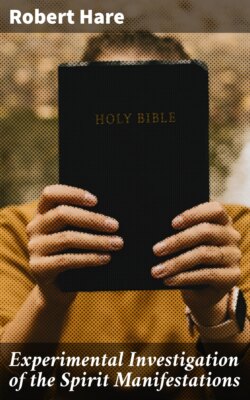Читать книгу Experimental Investigation of the Spirit Manifestations - Robert Hare - Страница 9
На сайте Литреса книга снята с продажи.
INTRODUCTION.
ОглавлениеTable of Contents
As introductory to this work, I shall make a few brief remarks on the following topics:—
Objects of religion.—Diversity of opinion as to the means by which they have been attainable.—Every sect, excepting one, would vote against any one.—Consequent sentiments of the Author as embodied in verse.—Reasons for his believing in the existence of a Deity.—American priesthood eminently honest and pious.—If people who have obtained a belief in immortality by one route are better and happier therefor, why object that others, by another route, should attain the same ends.—The table, no less than our firesides, an object of interest.—Inconsistency of those who make their Deity pass through all the stages of human existence, from the embryo to maturity, in objecting to the transient employment of tables.—Use of the tables soon laid aside in the manifestations to which the Author has resorted.—Inconsistency of accusing Spiritualists of undue incredulity as to scriptural miracles, and of the opposite defect as respects spiritual manifestations.—Of certain savans who strain at spiritual gnats, yet swallow scriptural camels.—Miracles of Scripture, if they ever occurred, can never be repeated; but the manifestations of Spiritualism will be repeated with an improved and a multifarious efficiency.—Religion and positive or inductive science having, under the guidance of devotion and atheism, been made to travel in opposite directions, are by Spiritualism so associated as to travel together in the same direction.—The atheist Comte would dissolve the union between theology and science.—According to Comte, where true science begins, the domain of theology terminates, being only a creature of the imagination.—According to Spiritualism, it is the domain of ignorance that is lessened, while theology, founded on knowledge, grows with its growth, and strengthens with its strength.—An effort to refute the idea of Comte, that the phenomena of the sidereal creation can be explained by gravitation; which, left to itself, would consolidate all the matter in the universe into an inert lump.—Suggestions respecting the devil.—Arguments founded on ignorance.
1. On all sides I presume that it will be admitted that the great objects of religion are as follows:—
2. To furnish the best evidence of the existence of a Supreme Deity, and of his attributes.
3. To convey a correct idea of our duty toward that Deity and our fellow creatures.
4. To impart that knowledge of a state of existence beyond the grave which will be happier as we are more virtuous in this life, and more miserable as we are more vicious; this knowledge affording the best consolation amid temporal sufferings of the righteous, and the strongest restraint upon the vicious indulgence of passion in the unrighteous.
5. Finally, by these means, to promote morality and the happiness of man in this world, and prepare him for a blissful position in the world to come.
6. It must result, from these premises, that whichever is most competent for the attainment of these all-important ends, will be the best religion.
7. The above-mentioned postulates being generally admitted, various recorded traditions, pretended to have been derived from one or more deities, have been advanced as best calculated to meet the requisitions in question. Each of the religious doctrines thus advanced is tenaciously defended by its appropriate priesthood. If the opinions of the majority of these advocates of their respective revelations be taken as respects any creed excepting their own, it will be denounced as originating in error or fraud. The opinion being taken successively upon any one, by all but those to whom it appertains, each would be condemned.
8. It was under these impressions that the following verses were written, more than forty years ago. They have recently been published in a pamphlet on the better employment of the first day of the week.
They serve to show that my skepticism arose from my love of truth, instead of that aversion from it, ascribed to skeptics by many well-meaning bigots.
9. Oh, Truth! if man thy way could find,
Not doomed to stray with error blind,
How much more kind his fate!
But wayward still, he seeks his bane,
Nor can of foul delusion gain
A knowledge till too late.
By sad experience slowly shown,
Thy way at times though plainly known,
Too late repays his care;
While in thy garb dark Error leads,
With best intent, to evil deeds
The bigot to ensnare.
Is there a theme more highly fraught
With matter for our serious thought
Than this reflection sad,
That millions err in different ways,
Yet all their own impressions praise,
Deeming all others bad?
To man it seems no standard’s given,
No scale of Truth hangs down from Heaven
Opinion to assay;
Yet called upon to act and think,
How are we then to shun the brink
O’er which so many stray?
10. How far I was a believer in God may be estimated from the following opinions, which have appeared in the pamphlet wherein the foregoing verses were published:
